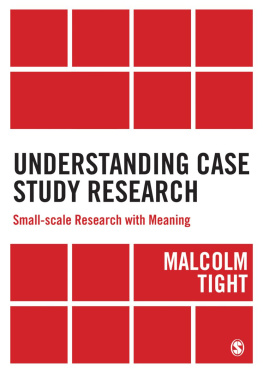DOING EXCELLENT SMALL-SCALE RESEARCHSAGE has been part of the global academic community since 1965, supporting high quality research and learning that transforms society and our understanding of individuals, groups and cultures. SAGE is the independent, innovative, natural home for authors, editors and societies who share our commitment and passion for the social sciences.
Find out more at: www.sagepublications.com
DOING EXCELLENT SMALL-SCALE RESEARCH
Derek Layder
SAGE Publications Ltd
1 Olivers Yard
55 City Road
London EC1Y 1SP
SAGE Publications Inc.
2455 Teller Road
Thousand Oaks, California 91320
SAGE Publications India Pvt Ltd
B 1/I 1 Mohan Cooperative Industrial Area
Mathura Road
New Delhi 110 044
SAGE Publications Asia-Pacific Pte Ltd
3 Church Street
#10-04 Samsung Hub
Singapore 049483
Editor: Chris Rojek
Editorial assistant: Martine Jonsrud
Production editor: Katherine Haw
Copyeditor: Sarah Bury
Proofreader: Derek Markham
Indexer: Charmian Parkin
Marketing manager: Ben Griffin-Sherwood
Cover design: Wendy Scott
Typeset by: C&M Digitals (P) Ltd, Chennai, India
Printed by: Replika Press Pvt. Ltd
Derek Layder 2013
First published 2013
Apart from any fair dealing for the purposes of research or private study, or criticism or review, as permitted under the Copyright, Designs and Patents Act, 1988, this publication may be reproduced, stored or transmitted in any form, or by any means, only with the prior permission in writing of the publishers, or in the case of reprographic reproduction, in accordance with the terms of licences issued by the Copyright Licensing Agency. Enquiries concerning reproduction outside those terms should be sent to the publishers.
Library of Congress Control Number: 2011945430
British Library Cataloguing in Publication data
A catalogue record for this book is available from the British Library
ISBN 978-1-84920-182-7
ISBN 978-1-84920-183-4 (pbk)
CONTENTS
ABOUT THE AUTHOR
Derek Layder is Emeritus Professor of sociology at University of Leicester, UK. He was awarded a doctorate by the London School of Economics in 1976. Appointed Lecturer in sociology at the University of Leicester in 1974 and promoted to Reader in 1995, he became Professor in 1997 and Emeritus Professor from 2002. He has held several visiting academic positions and has also held honorary visiting appointments at The Australian National University (as a Humanities Research Fellow) and the University of Western Sydney (as Eminent Research Visitor). He taught in the areas of social theory, social psychology, social research methods and the philosophy of social science. He has published numerous academic articles and 11 books. Among his books, in the area of the philosophy of social science he is the author of The Realist Image in Social Science (1990), in social theory he has written Understanding Social Theory (second edition, 2006), as well as Modern Social Theory (1997). On research strategies and methods he has authored New Strategies in Social Research (1993) and Sociological Practice (1998). He has also written on intimacy, emotion and self-identity, including Emotion in Social Life (2004), Social & Personal Identity (2004) and Intimacy & Power (2009).
PREFACE
This is an introductory guide for those who need to carry out small-scale research. However, it is suitable for a broad readership, including undergraduates, postgraduates and more experienced researchers. I have written it with a view to helping undergraduates with research projects that are part of their degree work. But postgraduates (at masters and doctoral levels), researchers outside academia, and more experienced academics may also find it helpful because it offers an in-depth account of a specific approach to social research.
Instead of describing an exhaustive list of options, the book offers a particular way of doing social research that focuses on how human behaviour is linked to its social contexts. It leads the researcher through the actual process of doing a research project from start to finish, by providing systematic guidelines and advice.
However, the book covers many of the general areas and issues in research, such as: preparation and planning, research ethics, validity, identifying problems and developing research questions, applying techniques of observation, interviewing, documentary sources, blending quantitative and qualitative data, sampling, the use of concepts, coding and data analysis. As such, the book should be useful to those in the following fields and disciplines: sociology, psychology, management and business, health studies and nursing, education, media studies, organisation studies, criminology, social work and social policy, sport and leisure studies, politics and many others.
I have removed all obscure terms and technical issues, in an effort to make it as clear and direct as possible. Most of this attempt at simplification and clarity is fairly self-explanatory. However, there is one issue that deserves some special mention. I often use explanation instead of theory because explanation is a more familiar (and less anxiety-inducing) term. And anyway, theory is a form of explanation, so nothing is lost given my aim of clarity and accessibility. At other times, I use the term analytic or analytic issues to mean roughly the same as theory or theoretical issues.
How to Read the Book: The Plan of Chapters
While each chapter deals with particular aspects of social research, there are two important issues that are treated more generally throughout most of the chapters. First, the ethics of social research the rules that govern how you should treat your research subjects which are first discussed at the end of . Other chapters raise ethical issues as they arise from the discussion of particular practices and methods.
.
As far as the content of particular chapters are concerned, prepare you for the rest of the books more conventional description of what is entailed in doing a research project. But these chapters should not be skipped over since they discuss key issues relevant to an understanding of the overall approach.
) that underpin them, and how they differ from research topics and questions.
discusses in more depth how problems and topics are related in adaptive research, and how they influence core research questions. I give this separate and advance treatment because it plays such a crucial role in the adaptive approach. Research problems as opposed to research topics or research questions are defined quite differently from conventional introductory texts. This also entails grasping the distinction between conceptualisation and description (and its role in explanation). Mastering the research skills entailed in handling these distinctions is crucial to putting adaptive principles into research practice.









